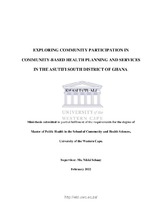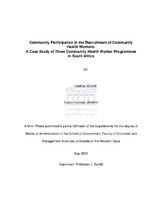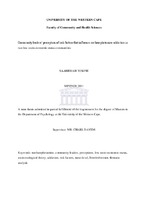| dc.contributor.advisor | Schaay, Nichola Niki | |
| dc.contributor.author | Ali, Kwasi Tutu | |
| dc.date.accessioned | 2022-02-24T10:11:39Z | |
| dc.date.available | 2022-02-24T10:11:39Z | |
| dc.date.issued | 2021 | |
| dc.identifier.uri | http://hdl.handle.net/11394/8741 | |
| dc.description | Magister Public Health - MPH | en_US |
| dc.description.abstract | Disparity in health service delivery between Ghana’s urban and rural areas has been noted to have contributed significantly to the huge gap that exists in health status between the rural and urban areas in the country. Consequently, since the Alma Ata Conference in 1979, Ghana has had a policy of making community-based services available to all, through community-based care and has adopted the Community-based Health Planning and Services (CHPS) Initiative as a national health reforms strategy to mobilize volunteerism, resources and cultural institutions for supporting community-based primary health care. The successful implementation of the CHPS initiative rests heavily on the participation and involvement of the communities. | en_US |
| dc.language.iso | en | en_US |
| dc.publisher | University of Western Cape | en_US |
| dc.subject | Ghana health service | en_US |
| dc.subject | Asutifi South District | en_US |
| dc.subject | Community members | en_US |
| dc.subject | Community health management committee | en_US |
| dc.subject | Community-based health planning | en_US |
| dc.title | Exploring community participation in community-based health planning and services in the Asutifi south district of Ghana | en_US |
| dc.rights.holder | University of Western Cape | en_US |




